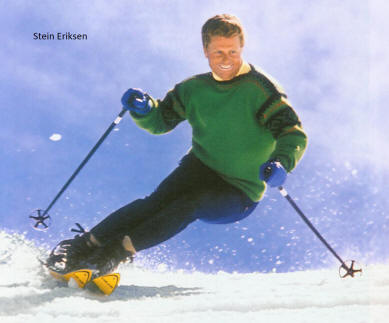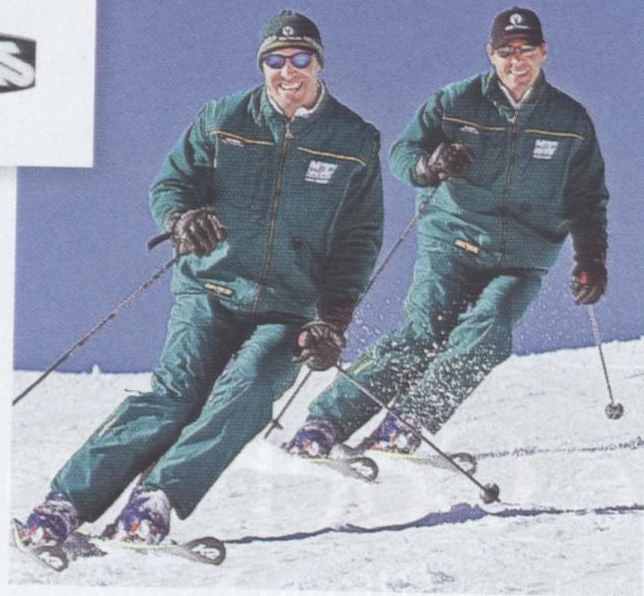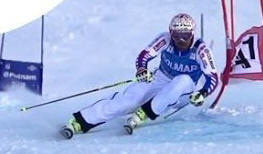|
Did you come here from a link on another
website? See page bottom for latest version of this page.
This site is not associated with any ski area. Use of any page
means you accept the SkiMyBest
Site Use
Agreement or
EXIT NOW.
 "SKIING
IS A SLIDING SPORT":
"SKIING
IS A SLIDING SPORT":
Conventional Skiing Wisdoms (CSW's)
by
Bill Jones, Ski
Instructor
Certified Professional Ski Instructor
(Registration #110478)
How To Reserve a Private Ski Lesson with Bill Jones
CSW #1: "Keep the feet and therefore the
skis together. "
CONVENTIONAL SKI WISDOM # 1:
“Keep the feet and therefore the skis together.”

Many folks think skiing with the skis
in a close stance makes
for a "cool" look, as shown by Stein Eriksen at left, one of the
world's all-time best and handsomest skiers. (Who could argue
with that?) However, such a "locked stance" with skis together
and even touching, because of human anatomy precludes the
ability to rotate the legs' thigh bones inside the hip joints
(this movement is called "braquage" and note the plurals
of "legs' thigh bones"). Stein was such an acrobat that he can do about anything he wanted on
his skis and still perform admirably. (He died at 88 years,
still skiing.) But for most of the rest
of us, rotating the thigh bones inside the hip joints is a most
useful mechanic in modern advanced skiing. This rotation allows
us to steer the skis rather than have them steer us. And along
with this to steer each ski at a different radius, for the
inside ski of a turn must move through a tighter radius than the
outside ski--and tighter the shorter the radius. The braquage
movement is rarely discovered without help from an instructor.
Without braquage, a turn is often initiated
with a strong thrust of a hip or the entire body around the body's axis. Most
untrained skiers ski this way. Although this thrust gets the
turn going, it places the body in a non-functional position
during the first part of the turn and requires a correcting
movement to get lined up again, thus taking longer to get the
next turn initiated.
thrust of a hip or the entire body around the body's axis. Most
untrained skiers ski this way. Although this thrust gets the
turn going, it places the body in a non-functional position
during the first part of the turn and requires a correcting
movement to get lined up again, thus taking longer to get the
next turn initiated.
Stance width can still vary, however. Unlike
on groomed snow, in powder snow where the skis sink under the
surface, the feet are held a bit closer together (but not
together) so the greater snow resistance is less likely to catch
a ski and direct it away from the skier. And in bumps the stance
is also narrower than otherwise so the skis won't be tracking at
different heights and therefore be harder to manage. But in
neither case--if one is to maintain the valuable braquage
option--should these stance variations be so much as to lock the
legs in the hip joint.
At right, see Olympic champion Mahre twins
skiing with legs/feet and skis apart and belly-buttons looking
at you in a stance that is more like that used in most sports.
Which stance will work better for you? Try both. Find out which
stance allows you to change what you are doing more easily and
quickly, once you get used to both. And below see a modern racer
and note that his skis are far apart but his legs are not so
much, due to his tipped angle:

[Stein
is from Skiing History, January-February 2016, cover;
Mahres from Ski Magazine, November 2013, page 87.]
main CSW
contents
next CSW #2:
"Sit back when skiing powder"
 "SKIING
IS A SLIDING SPORT"--a skiing web manual: "SKIING
IS A SLIDING SPORT"--a skiing web manual:
Skiing Web
Manual Contents
Why Read This
Skiing Web Manual
That First Skiing Lesson
A Little Skiing
History
Motion in Skiing
CONVENTIONAL
SKIING WISDOMS
Skier Excuses
Fear in Skiing
Conditioning for
Skiing
Equipment and Technique
Skiing
Equipment
How
Skis Work
How to
Develop Balance on Skis
A Skiing
Turn Simplified The
Final Skiing Skill: pressure management
Tactics for
Terrains and Snow Textures and Racing
Skiing Tips
and Tales--a potpourri
Exercises for
Developing Skiing Skills
Children and
Skiing Age
and Skiing
Gender & Skiing Culture
& Skiing
Skiing Ethics and Survival
Slope Safety
Skiing
Environment Videos
and Apps
Glossary
Acknowledgements
SkiMyBest
Website Contents
This "CSW #1: 'Keep the feet...'" page last
modified
March 8, 2025.
Did you come here from a link on another website? For latest
version of this page, copy to your browser:
http://www.SkiMyBest.com/skiCSW01.htm
Copyright © 2013, 2014, 2015, 2016, 2017, 2018, 2019, 2020, 2021, 2022. William R Jones.. |